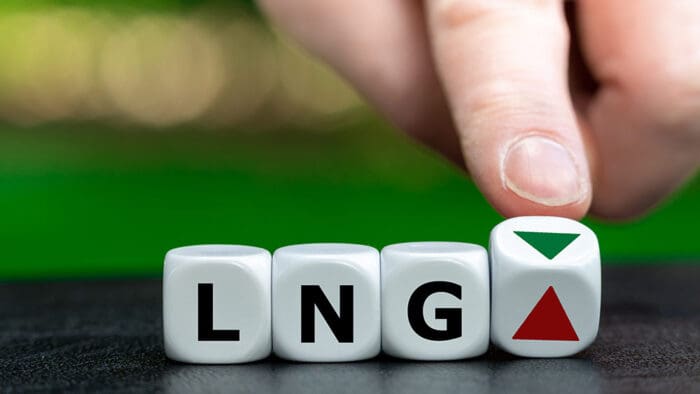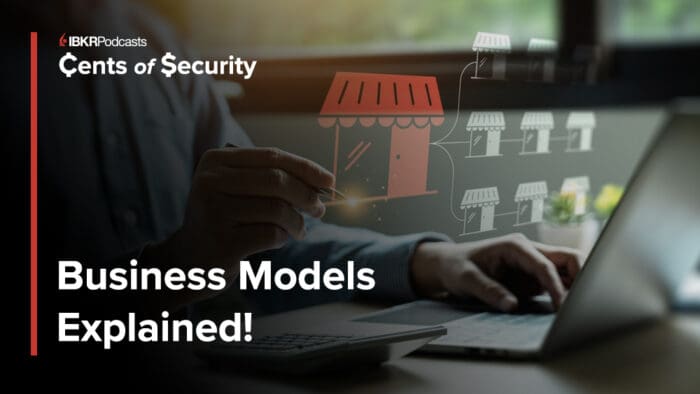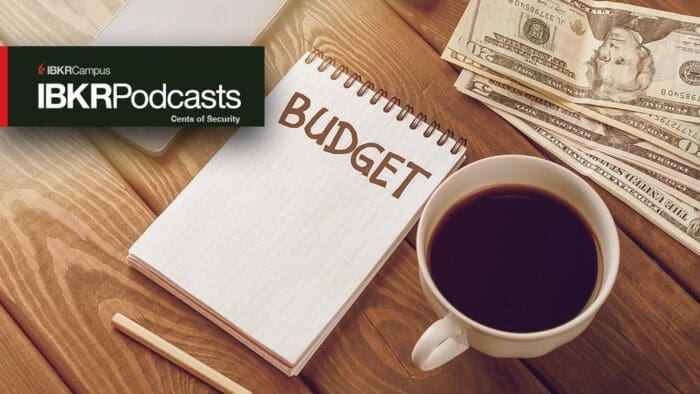Kayla Melagrano, Product Specialist-Education at Interactive Brokers, and Jose Torres, Senior Economist at Interactive Brokers, share budgeting tips including sticking to a budget and saving for big purchases.
Summary – Cents of Security Ep. 3
The following is a summary of a live audio recording and may contain errors in spelling or grammar. Although IBKR has edited for clarity no material changes have been made.
Kayla Melagrano
Welcome to IBKR podcasts, i’m Kayla Melagrano, a member of the Interactive Brokers Trading Education team. I’m joined here today with José Torres, our Interactive Brokers senior economist. And today, we’re going to be talking about budgeting. So, what is budgeting— a budget is essentially a spending plan based on your income and expenses. So, it’ll look at how much money you make and spend over a certain period of time. And then a simple example of this is the 50/30/20 rule— so 50% of your income goes to needs, 30% goes to wants, and 20% goes into savings. And with that, you could start by looking at your current expenses and categorize it into needs and wants and then keep a record of the budget and track your daily expenses. Budgeting — why is it important?
José Torres
Hi Kayla, great to be here. Well, I think budgeting is important because, like you said, organizing income and expenses is important when considering short-, medium- and long-term goals, particularly when making large purchases like student loans, car payments, home payments, and rent payments. All those kinds of expenses can add up pretty quickly, so organizing the amount of income and current expenses now and later is very important.
Kayla Melagrano
Regularly tracking and checking your budget can also help you out in identifying areas where you might be overspending. And then, you know, being able to keep an emergency fund. So having those savings for unexpected expenses in the future, where if you’re not budgeting something might come up and you don’t have those savings.
José Torres
Absolutely. Also, organizing expenses like that is really integral because if you go over one month, then the next month, you know how much under you have to go to sort of balance the books. Sometimes, folks get excited, whether it’s summertime or Christmas season or Easter or their birthdays, they tend to travel and consume a lot more than their regular average. So, taking that into account, it’s important to know when it’s time to maybe cut back a little bit. And organizing those expenses is very helpful, because if you’re not organizing those expenses— as humans, the propensity to consume is particularly high and there’s so many things for us to buy that we can consume all the time, whether it’s restaurants, whether it’s clothing, whether it’s vacations, whether it’s a new home, new car, right? So, if we don’t keep track of our expenses our emotions can become unanchored, and we can then begin to spend a lot more than we’d like to spend.
Kayla Melagrano
Yeah, definitely. And one thing that I think some people might struggle with is once you start off with budgeting, how to stick with the budget. So, you know, just creating the budget is the first part, but then after that you want to make a plan to stick to the budget. One easy way that I go about sticking to a budget is automating my savings. So, I’ll have a portion of my paycheck automatically deposited into my savings account, my retirement account, and then an investment account as well. So, that way I have the money already going to the savings and then any leftover I can allocate to any necessities and then also things that I just want.
José Torres
Yeah, that’s a great point. And I think that’s really impressive to be able to with the technology that we have nowadays. We can really put our savings and our investment goals on autopilot, right? And that way, we see the money that we can spend on discretionary items and it’s integral. And especially now, you know, we talk a lot about it in my commentaries; we’re in an inflationary regime with higher interest rates and it’s making consumers feel particularly worse than they did three or four years ago pre-pandemic because the pressure of high interest rates alongside high prices makes affordability really problematic.
Kayla Melagrano
And there’s a lot of different tools that are available to stick with the budget as well. These tools will make it really easy to just input your spending categories and then monitor your budget for whatever period, say, on a monthly basis. I know one way is creating an Excel file and just adding in the different categories of where you’ll be spending. Create some formulas to add up those categories and calculate what percent of your income is going to each category and then just filling in your expenses as you go. But there’s other ways, too, that are easier if you don’t want to create an Excel file, or if that doesn’t work with your lifestyle. You can search online for different budgeting apps or websites, and there’s apps where you can just enter in the expenses, and it’ll calculate it for you. Even my bank has an online banking app where they have a spending and budgeting section that you can just view all of your expenses categorized and track your monthly spending from there. And then one other way is digital enveloping, so the envelope system of budgeting typically uses cash and envelopes to divide up your money into different categories. But nowadays, with new technology, you can open different accounts, different savings accounts and have, say, one account for buying a new car and one for vacation and one for long-term savings. So, you can open up all of these different accounts and allocate your money into different accounts to help you save and keep it all separate.
José Torres
Great. And another interesting aspect is where are you parking your money, right? So, gaining interest on your income and on your savings is really important. And here at Interactive Brokers, we actually pay a really high rate of 4.58% on idle cash. So, opening an account with Interactive Brokers, for example, and then having our debit card enables you to gain interest on your savings and your paychecks that are going into that account. And then you can also spend it freely with the debit card, whenever you need to pay bills or you want to spend on discretionary items— at Interactive Brokers, we enable you to do that. And consumers and savers have their money parked in non-interest-bearing accounts, and that can be particularly problematic because we’re living in an environment of rising prices, so savings are not really all you need to do to maintain or upgrade your lifestyle. You also want to build on those savings, and one easy way is by having your money here at Interactive Brokers where we will be paying you interest on your idle cash. And of course, we have a lot of other things for more sophisticated investors as well. We have a wealth of stock bond, currency, Bitcoin, and crypto. We have all kinds of different investments including international stocks, and international bonds. We have a wide suite of trading and investing tools for folks that are just beginning, but also for very sophisticated individuals and institutions.
Kayla Melagrano
I know that it’s very popular right now to have accounts, you know, high yield savings accounts where you can just earn interest on your money. If you’re saving that money and you don’t want to spend it or maybe, you aren’t ready to start investing— having a high yield savings account where you can earn interest on the money instead of it just sitting in an account.
José Torres
I mean, it’s very important for us to, you know, gain interest on our savings. Again, because of all the pressures that we’re dealing with now as an economy and as a society.
Kayla Melagrano
One other thing that I wanted to talk about here is saving for big purchases. So, say you have an existing budget all set up, but then down the line you want to buy a new car. How to go about saving for those bigger purchases that might come up? I know one thing to start off would just be determining how much you need to save. If you have a specific goal, see how much you need to reach that goal, and then you kind of adjust your existing budget. See how much you need to save— maybe a little extra on a monthly basis and where you can maybe cut back. And then if you’re buying a car, for example, keep in mind any other costs that go into buying the car. So monthly car payments, if you’re going to have a car loan, how much those monthly car payments are going to be? Car insurance, maintenance fees, gas— there’s more that goes into it than just the initial purchase. And determining if you are taking out a car loan, how long is the loan term? What’s your down payment going to be? And if you want to increase your down payment or a longer loan term, then maybe our monthly payments are going to be less so just really looking at all the different aspects of the purchase and seeing how it fits into your budget and where you need to make adjustments.
José Torres
Some ways where you can save is by planning ahead of time and by being organized. So, by walking into an auto dealership with a lender that you already have, or if you walk into home buying with the lender that already approves you and stuff, it’s a lot better that way than relying on other folks to coordinate the lending for you, right? If you coordinate lending with other folks, it can be more expensive. There can be some incentives for the sales folks as well and you might not be getting the best pricing. Also, a really good way to save for big purchases is by saving big paychecks, right? So, some folks get really big tax return checks during the tax season, which runs from January to April, so taking that money and maybe not spending it on discretionary items but using it maybe to rent a new apartment or buy a vehicle, car, house or something like that. And saving those big chunks because you know they’re generally higher than one’s paychecks. Also, with homes and with automobiles, you also have other expenses that come up as well— maintenance, repairs, and insurance. So, important when you go into those kinds of purchases, also taxes, you consider all those other expenses because sometimes folks just think about it, ‘Well, what’s my monthly payment, right?’ And they don’t factor in those extra other costs that could be particularly significant, boosting that headline number by maybe $200, $300, $400 and when some folks factor that in, they actually realized, ‘wow, you know, this is not the purchase that I wanted, and I can’t actually afford this.’ And you know, I call that buyer’s remorse and as the consumer, you never want prudent saver. You never want to be in a position where you have buyer’s remorse. Another rule I like to use sometimes is if you really want something and you feel the emotional surge of wanting to purchase something, give yourself a break. Give yourself a timeout and give yourself 30 minutes. And if you just wait for 30 minutes and then re-analyze if you want to purchase that good or service— a lot of the times, maybe half the times, you realize, you know what, I can do without it anyway. I’d rather have more money in an account that’s gaining interest than just another piece of clothing that’s going to go in my already packed closets. So, those are some things that can help.
Kayla Melagrano
Yeah, definitely. Reducing impulse spending is a big one. Sometimes we’ll see something online or in a store and really want it in the moment. But if you wait a couple of days and sometimes you decide you don’t actually still want that or need it.
José Torres
Absolutely. And we live in a consumer society, right? 70% of our economy is consumption. So, it’s all in our face everywhere we go, even if we don’t go anywhere. On our phones like you said, Kayla, online, when you’re watching television, right, advertisements take up so much of our time, whether you’re enjoying time on social media or you’re enjoying a Netflix program or a YouTube program— it’s always in our face to drive us to spend more.
Kayla Melagrano
Yeah, I can definitely be easily influenced. Sometimes I try and practice by waiting before making purchases and then, you know, it’s always good to start budgeting or saving right away. Don’t wait to do it just because you don’t have something in mind. So maybe you live in the city, and you don’t have a need for a car, but there’s no harm in figuring out what potential goals could be in the future. That way, when it does come time to get one or you know, maybe you’re not ready to buy a house, but sometime in the future you’ll want to when it does come time to do that. It will come as less of a shock because you’ll have been saving up for it. So, it’s never too early to start saving and you never need to stop saving because there’s always going to be something that you’ll need that money for.
José Torres
And sometimes when we have 100 or 200 days in a row of sunshine, we forget what a storm looks like, right? We forget when maybe our income isn’t as high as it once was. Maybe our expenses aren’t as low as it once was. And then our budget can become constrained particularly quicker. So, it’s always important to be grateful and not take the moment for granted. If you’re doing really well on the income side and your expenses are going up dramatically, it’s important to have some balance. And one thing is athletes. A lot of athletes feel like they’re on top of the world. They’re doing so well, they have with the fans, they have all the attention, and they think that that will never sort of wane. For athletes, careers are particularly short, these are not your superstar athletes— they’re probably going to be doing well forever. But folks that maybe are on the bench most of the game or folks that have, you know, six or seven-year careers, right, they’ll be aged roughly 26 to 30 and they’ll have to use that money for the rest of their lives. So, they’re 75 or 80, which is right around the life expectancy. So, if they spend all of it during the time when they’re doing so well, then sometimes you can have problems down the road because they’re not generating as much income anymore. And maybe they can’t play in the NBA anymore or the NFL, they have to play in some lower-level leagues, like in Europe or in Canada where the revenues and the earnings aren’t the same. So, it’s important if you’re doing really, really well, you know, it’s alright to boost your expenses a little bit, but just understand that if you boost your expenses a lot, you’re holding yourself to that income level and that income requirement for a long period of time. Sometimes it’s just not realistic, particularly again with athletes when they peak at a young age.
Kayla Melagrano
Yeah, it’s hard to go back once you’re used to that higher level of spending, and I think a big thing also with budgeting is that people think of it as having to restrict themselves. But if you plan accordingly, you won’t have to restrict yourself. You can still do the things that you want to do and go on the trips that you want to go on, buy the things that you want to buy, but still be fitting it into your budget.
José Torres
Absolutely. And another thing that we haven’t touched on yet, that’s particularly important after mentioning athletes, is I haven’t mentioned 401K plans. These are tax advantage plans where you’re immediately saving on taxes and the IRS gives you around $23,000 that you can stash away, plus a Roth IRA right around 28 to 30,000. And that’s an opportunity that you have every year to put away some capital so that you can enjoy later on when you’re older and maybe you can’t earn as much money as you can now. Now, you know, we’ve obviously like for everyone to earn as much money as possible, all the time. But sometimes the constraints of life do get to us, so it’s important to have good cash buffers on the side. So that when a storm does hit, and you do have a rainstorm, a rainstorm can be a car accident, that requires a big out of pocket expense, could be healthcare costs that increased significantly. It could be a long list of unfortunate things that can happen to any of us, and it’s important that if we have those cash buffers, we actually don’t become that stressed when those things happen or as stressed as we otherwise would be, right? Because with our savings from previous years, we can cover those expenses and have some.
Kayla Melagrano
Yeah, definitely. I think that something else that’s kind of come up a lot in recent years is these sites where when you make a big purchase online, you can pay it off over time. So, say you’re just shopping for clothes. Maybe the cost is a little higher than you were expecting, and they give you the option to pay it off over time. But I think what some people don’t realize is if you can’t afford it in the moment, are you going to want to keep paying it off over the next few months? It might seem like spending $50 over the next four months doesn’t seem that bad, but if you look at the total in general, maybe it’s not a right purchase for you to be making if you can’t fit it into your budget.
José Torres
Right, and not just the money that went out the door, but the money that could have came in the door on the alternative side. Instead of you spending that money, you could have actually been gaining interest on the other side. So that’s also an important aspect of saving and budgeting. It’s not just the money that leaves you. It’s the money that didn’t come in because of that decision you made, right? So, that’s an opportunity cost that we constantly have to deal with whenever we spend. It’s not just the money we lost, it’s also the interest of the opportunity cost that went away because we spent that amount of capital.
Kayla Melagrano
Do you have any other tips for people that are just starting off with budgeting or aren’t really familiar with how it works or starting up their savings accounts?
José Torres
Absolutely, you know, being conservative and trying to save as much as you can of your paycheck and trying to remain satisfied and happy with the low-level amount of expenses is probably the best way. Delaying gratification can pay rewards, so not needing to purchase something to be happy, or to put a smile on your face. But waiting a couple of years before you get that item. Also keeping your discretionary spending, so spending that you don’t really need. So, this would be like restaurants or clothing to a percentage of your income. So maybe like 10%, 5% or 15% and that way you know this is how much money I can afford to just spend on whatever I want, right? And just having some tight stops and then also maybe going over during Christmas or during your birthday, but then maybe making it back the next month or two.
Kayla Melagrano
Yeah, planning ahead for times when you know that you might be spending a little bit more.
José Torres
And we see it all the time, you know, here in the economics group, we see seasonal adjustments. And we noticed that in December, there’s a huge spike in spending that always fizzles out in January. And that’s where you see the post-Christmas sales and New Year’s sales and all that. Those are also some trends that one can take advantage of when you’re looking for some discounts or some price concessions— shop at a time when a lot of shoppers aren’t out there.
Kayla Melagrano
Taking advantage of sales rather than times when everything’s just going to be full price or prices are increased.
José Torres
Yeah, for sure.
Kayla Melagrano
Thank you, José, for joining the podcast here today and for all of your insight regarding budgeting. For all our listeners, we do have some additional podcasts up as well regarding credit history and 401K’s already. Thank you.
Disclosure: Interactive Brokers
The analysis in this material is provided for information only and is not and should not be construed as an offer to sell or the solicitation of an offer to buy any security. To the extent that this material discusses general market activity, industry or sector trends or other broad-based economic or political conditions, it should not be construed as research or investment advice. To the extent that it includes references to specific securities, commodities, currencies, or other instruments, those references do not constitute a recommendation by IBKR to buy, sell or hold such investments. This material does not and is not intended to take into account the particular financial conditions, investment objectives or requirements of individual customers. Before acting on this material, you should consider whether it is suitable for your particular circumstances and, as necessary, seek professional advice.
The views and opinions expressed herein are those of the author and do not necessarily reflect the views of Interactive Brokers, its affiliates, or its employees.
Disclosure: IBKR Tax Disclosure
Interactive Brokers does not provide tax advice, does not make representations regarding the particular tax consequences of any investments, and cannot assist clients with tax filings. Investors should consult with their tax professional about the tax implications of any investment.

















Join The Conversation
If you have a general question, it may already be covered in our FAQs. If you have an account-specific question or concern, please reach out to Client Services.